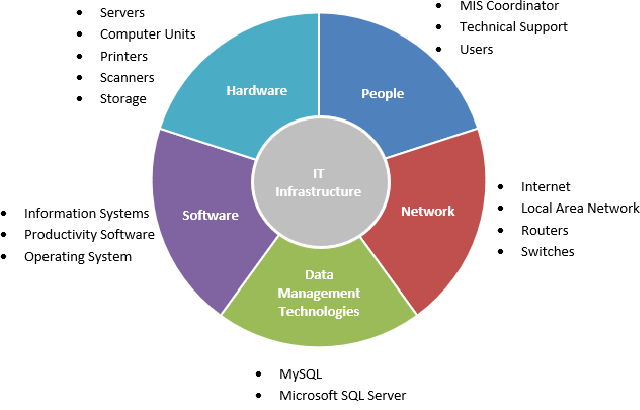Infrastructure Audit Latest 2022
Why You Should Consider an IT Infrastructure Audit
Infrastructure Audit -For your business to survive, it must be built upon an extremely strong IT infrastructure. Your IT infrastructure ensures that you have data availability and that you keep your data private. Despite this, even if your IT infrastructure is strong, there are always internal and external threats abound.
Technology evolves extremely rapidly, meaning that the investment you put into your IT department today, may not be enough to meet the demands of tomorrow. This is essentially what an IT infrastructure audit is, setting yourself up for the future by understanding what you truly use, and what you do not.
What Is an IT Infrastructure Audit?
When going through an IT infrastructure audit, you will be able to identify pieces of underutilized data center equipment. Once doing so, you will be able to decide what can be repurposed or retired depending on the need.
You may also be able to identify if any of your equipment have an expired or overlapping maintenance contract. This will save you money as well.
What Is the Purpose of an IT Audit?
The main purpose of an IT audit is to evaluate your data systems that are already in place. Typically you would have an audit done to evaluate your organization’s ability to protect its information assets, as well as its ability to distribute that information to authorized parties.
What Happens During an IT Infrastructure Audit?
During your audit, you will have a certified engineer employ state-of-the-art tools designed to test and enhance the functionality of your network. Regardless of how many vendors you are using, or which vendors, you will still be able to perform an audit and find out necessary information. This is also independent of the age of the equipment.
Performing an infrastructure audit is a non-invasive procedure. Simply escort an on-site engineer to do their work, while you sit back and relax.
Once your IT infrastructure audit has been completed, you will be presented with a report that outlines all of the findings. This should include a detailed report that you should be able to understand easily. It will contain a detailed overview, as well as solutions that will help to both extend the life of your equipment and decrease total cost of ownership.
Different Types of IT Audits
Technological innovation process audit: Creates a risk profile for current projects as well as new projects. It may also assess the experience of the company related to the technologies it has chosen, the company’s presence in the current market, and the organization structure.
Innovative comparison audit: This audit analyzes the abilities of a company to innovate, and its comparison to its biggest competitors. This will include the examination of a company’s research as well.
Technological position audit: This type of audit reviews the technologies that the business currently uses. It will also decide if it needs to purchase new technology, and if it should replace the old. There are four characterizations placed on different technologies: base, key, pacing, or emerging.

Different Categories of IT Audits
Systems and Applications: This form of audit is used to verify that all of the different systems and applications you are using are efficient. It also is used to ensure that your system is working in a valid, reliable, and secure manner.
Information Processing Facilities: To verify that a processing facility is controlled, and processes its applications efficiently, this audit is used. It confirms that applications are under conditions that are normal, and identifies any possible negative conditions.
Systems Development: In order to confirm that the systems being developed meet the objectives of your company, a systems development audit will be done. It will also help to ensure that your systems are at an accepted standard.
Management of IT and Enterprise Architecture: Verifies that IT management has developed a structure, as well as procedures, that accommodate an efficient environment and facilitate information processing.
Client/Server, Telecommunications, Intranets, and Extranets: Work to put into place telecommunication controls. Primarily aids in networks and servers being aligned.
How to Audit IT Infrastructure
The following tasks generally happen while auditing IT infrastructure.
1-Comprehensive health-check analysis of the equipment.
2-Current age of all the technology in your business environment.
3-Notification of machines that are eligible for decommissioning or physical removal.
4-Recommended fixes and options for savings through certified pre-owned upgrades.
5-Recommended savings to replace current maintenance plans.
Infrastructure Audit -Common IT Hardware Audit Failures
Having outdated policies or no policies in place.
Lack of vulnerability scanning or penetration (PEN) testing.
Lack of an Intrusion Prevention System (IPS). Alternatively, if your IPS is not properly managed.
Lack of two-factor authentication for any form of remote access.
You allow your IT staff to enact as security staff and do not have a dedicated security staff.
There is no up-to-date disaster recovery plan or tested business continuity plan.
No data loss prevention plan in place.
Lack of keeping up to date with OS, network or applications updates.
Lack of a network and system drawings showing the architecture of the network as well as data flow.
Benefits of an Infrastructure Audit for Your IT Systems
While it may seem like a fruitless process, you can actually reap many long-term operational benefits when you audit IT infrastructure.
Reduce Risks
Since most of your accounting will be done on the cloud, your information might be vulnerable. By performing an IT audit, you will be assured that you have the lowest possible risk. You will also be able to create proper strategies to enhance security by understanding high risk areas.
Enhance Data Security
You will create more of a sense of confidentiality, availability, and integrity of your data. An IT audit will help to ensure the safety of any sensitive data and prevent it from encountering threats.
Reduce IT Costs
Allows you to make informed decisions by planning your IT spend properly.
Ensure Software Compliance
This will give you peace of mind in what you have and what you use. It will also help you understand if the system is functioning efficiently and if it is meeting all the goals that it should be meeting.
Alignment of IT & Business Goals
This is helpful if you have any plans to expand or grow in the near future, or even if you plan on acquisition.
Validate Server Configuration
Provides you with the tools you need to be as efficient as possible.
Evaluate Your System
Conducting an IT audit will allow you to truly evaluate your system. This in turn will ensure your back up systems are monitored, and that you can identify repetitive problems. Not only that, but you will know if you have been investing in the right systems.
Help to Reduce & Mitigate Risks
By truly understanding your system, you will have the information to assess controls that will help you to avoid and reduce risks.
When to Get an IT Audit- Infrastructure Audit
There are many cases where your business or enterprise will benefit from an IT audit. If your company is growing and adding new employees, it is a great time to perform an audit. Not only will this allow you to make sure that you have enough equipment for everyone, but it will allow you to see what needs to be replaced.
When you are changing or upgrading your core systems is another great time for an IT infrastructure audit. This is specifically to understand what maintenance plans have expired, or how you might be missing out on savings.
The same can be said if you are having concerns about your current IT service provider. An IT audit can allow you to bring in a new company, such as Park Place Technologies, to give you a second opinion. If your previous service provider was not doing all they should have been doing, you might find many places that you could be saving.
Regardless of what is going on in your business, if it has been more than two to three years since your last audit, it is time for another one.
Read More About FISMA
Buy From Amazon
